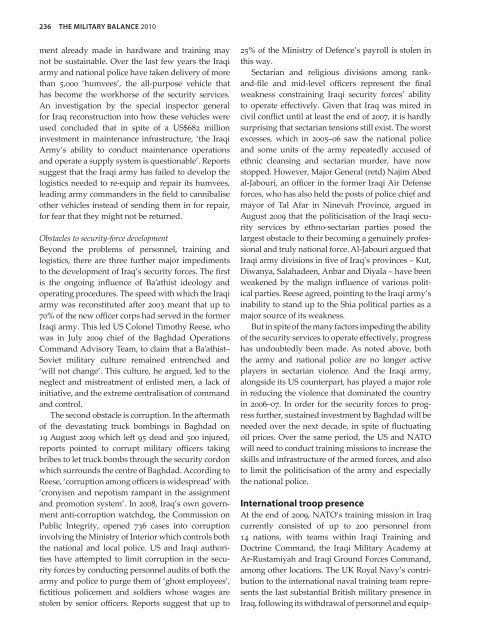You also want an ePaper? Increase the reach of your titles
YUMPU automatically turns print PDFs into web optimized ePapers that Google loves.
236 ThE MiliTAry BAlANcE 2010<br />
ment already made in hardware and training may<br />
not be sustainable. Over the last few years the Iraqi<br />
army and national police have taken delivery of more<br />
than 5,000 ‘humvees’, the all-purpose vehicle that<br />
has become the workhorse of the security services.<br />
An investigation by the special inspector general<br />
for Iraq reconstruction into how these vehicles were<br />
used concluded that in spite of a US$682 million<br />
investment in maintenance infrastructure, ‘the Iraqi<br />
Army’s ability to conduct maintenance operations<br />
and operate a supply system is questionable’. Reports<br />
suggest that the Iraqi army has failed to develop the<br />
logistics needed to re-equip and repair its humvees,<br />
leading army commanders in the field to cannibalise<br />
other vehicles instead of sending them in for repair,<br />
for fear that they might not be returned.<br />
Obstacles to security-force development<br />
Beyond the problems of personnel, training and<br />
logistics, there are three further major impediments<br />
to the development of Iraq’s security forces. The first<br />
is the ongoing influence of Ba’athist ideology and<br />
operating procedures. The speed with which the Iraqi<br />
army was reconstituted after 2003 meant that up to<br />
70% of the new officer corps had served in the former<br />
Iraqi army. This led US Colonel Timothy Reese, who<br />
was in July 2009 chief of the Baghdad Operations<br />
Command Advisory Team, to claim that a Ba’athist–<br />
Soviet military culture remained entrenched and<br />
‘will not change’. This culture, he argued, led to the<br />
neglect and mistreatment of enlisted men, a lack of<br />
initiative, and the extreme centralisation of command<br />
and control.<br />
The second obstacle is corruption. In the aftermath<br />
of the devastating truck bombings in Baghdad on<br />
19 August 2009 which left 95 dead and 500 injured,<br />
reports pointed to corrupt military officers taking<br />
bribes to let truck bombs through the security cordon<br />
which surrounds the centre of Baghdad. According to<br />
Reese, ‘corruption among officers is widespread’ with<br />
‘cronyism and nepotism rampant in the assignment<br />
and promotion system’. In 2008, Iraq’s own government<br />
anti-corruption watchdog, the Commission on<br />
Public Integrity, opened 736 cases into corruption<br />
involving the Ministry of Interior which controls both<br />
the national and local police. US and Iraqi authorities<br />
have attempted to limit corruption in the security<br />
forces by conducting personnel audits of both the<br />
army and police to purge them of ‘ghost employees’,<br />
fictitious policemen and soldiers whose wages are<br />
stolen by senior officers. Reports suggest that up to<br />
25% of the Ministry of Defence’s payroll is stolen in<br />
this way.<br />
Sectarian and religious divisions among rankand-file<br />
and mid-level officers represent the final<br />
weakness constraining Iraqi security forces’ ability<br />
to operate effectively. Given that Iraq was mired in<br />
civil conflict until at least the end of 2007, it is hardly<br />
surprising that sectarian tensions still exist. The worst<br />
excesses, which in 2005–06 saw the national police<br />
and some units of the army repeatedly accused of<br />
ethnic cleansing and sectarian murder, have now<br />
stopped. However, Major General (retd) Najim Abed<br />
al-Jabouri, an officer in the former Iraqi Air Defense<br />
forces, who has also held the posts of police chief and<br />
mayor of Tal Afar in Ninevah Province, argued in<br />
August 2009 that the politicisation of the Iraqi security<br />
services by ethno-sectarian parties posed the<br />
largest obstacle to their becoming a genuinely professional<br />
and truly national force. Al-Jabouri argued that<br />
Iraqi army divisions in five of Iraq’s provinces – Kut,<br />
Diwanya, Salahadeen, Anbar and Diyala – have been<br />
weakened by the malign influence of various political<br />
parties. Reese agreed, pointing to the Iraqi army’s<br />
inability to stand up to the Shia political parties as a<br />
major source of its weakness.<br />
But in spite of the many factors impeding the ability<br />
of the security services to operate effectively, progress<br />
has undoubtedly been made. As noted above, both<br />
the army and national police are no longer active<br />
players in sectarian violence. And the Iraqi army,<br />
alongside its US counterpart, has played a major role<br />
in reducing the violence that dominated the country<br />
in 2006–07. In order for the security forces to progress<br />
further, sustained investment by Baghdad will be<br />
needed over the next decade, in spite of fluctuating<br />
oil prices. Over the same period, the US and NATO<br />
will need to conduct training missions to increase the<br />
skills and infrastructure of the armed forces, and also<br />
to limit the politicisation of the army and especially<br />
the national police.<br />
International troop presence<br />
At the end of 2009, NATO’s training mission in Iraq<br />
currently consisted of up to 200 personnel from<br />
14 nations, with teams within Iraqi Training and<br />
Doctrine Command, the Iraqi Military Academy at<br />
Ar-Rustamiyah and Iraqi Ground Forces Command,<br />
among other locations. The UK Royal Navy’s contribution<br />
to the international naval training team represents<br />
the last substantial British military presence in<br />
Iraq, following its withdrawal of personnel and equip-


